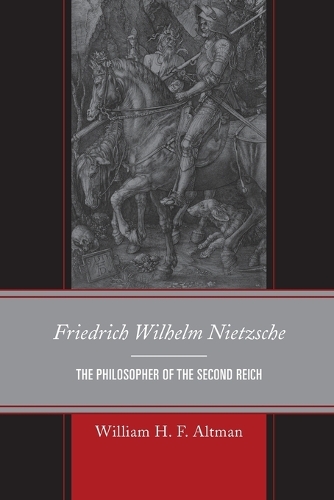
Friedrich Wilhelm Nietzsche: The Philosopher of the Second Reich
(Paperback)
Publishing Details
Friedrich Wilhelm Nietzsche: The Philosopher of the Second Reich
By (Author) William H. F. Altman
Bloomsbury Publishing PLC
Lexington Books
29th May 2014
United States
Classifications
Professional and Scholarly
Non Fiction
European history
First World War
Political science and theory
193
Physical Properties
Paperback
298
Width 154mm, Height 228mm, Spine 22mm
454g
Description
When careful consideration is given to Nietzsches critique of Platonism and to what he wrote about Bismarck, Kaiser Wilhelm, and to Germanys place in international relations (die Groe Politik), the philosophers carefully cultivated pose of untimeliness is revealed to be an imposture. As William H. F. Altman demonstrates, Nietzsche should be recognized as the paradigmatic philosopher of the Second Reich, the short-lived and equally complex German Empire that vanished in World War One. Since Nietzsche is a brilliant stylist whose seemingly disconnected aphorisms have made him notoriously difficult for scholars to analyze, Friedrich Wilhelm Nietzsche is presented in Nietzsches own style in a series of 155 brief sections arranged in five discrete Books, a structure modeled on Daybreak. All of Nietzsches books are considered in the context of the close and revealing relationship between Friedrich Wilhelm Nietzsche (named by his patriotic father after the King of Prussia) and the Second Reich. In Preface to A German Trilogy, Altman joins this book to two others already published by Lexington Books: Martin Heidegger and the First World War: Being and Time as Funeral Oration and The German Stranger: Leo Strauss and National Socialism.
Reviews
In this imaginative and refined commentary on Nietzsche's political thought, Altman provides an incisive critique of the achievement of Nietzsche, as well as his limitations. The work is the third volume of a trilogy on German political thought, following the author's earlier studies of Martin Heidegger and Leo Strauss. Utilizing Nietzsche's own aphoristic style as evinced in his Daybreak, the main arguments of the book are presented in the course of five chapters ("books") composed of 155 essays, 63 pages of notes, and other ancillary writings. The first chapter critiques Nietzsche as the classicist who looked to the past, but equally to the future, to evaluate the crisis of liberal institutions in his own time and place. Chapter 2 even more explicitly demonstrates Nietzsche's connection to the political world of the Second Reich. Nietzsche's criticisms of Plato, and his rather limited appreciation of Aristotle, are presented in chapter 3. Nietzsche's defense of aristocratic elitism and his assimilation and use of Platonic themes, especially dualism, are assessed convincingly by the author as well. The two final chapters place Nietzsche within the historical context of the Second Reich, providing insightful reflections on Nietzsche's influence during WW I. Summing Up: Recommended. All readership levels. * CHOICE *
In this aphoristic examination of Nietzsche, Altman situates his thought exactly where it is most appropriate and understandable: in the context of German politics and society in the nineteenth century. Altman thus refutes Nietzsches own claim that he was an 'untimely' observer and demonstrates instead his many and intricate connections with contemporary events and individuals. Altmans great service to Nietzsche scholarship is to remove the philosopher from the ethereal realm of philosophical speculation and to place him squarely in the Second Reich. -- Robert C. Holub, Ohio State University
Altmans book explores and illuminates Nietzsches complex relationship with the Second Reich, portraying Nietzsche not as a strict anti-nationalist but as perceptively engaging the questions of German domestic and foreign policy, expressing the contradictions of the Bismarckian era so profoundly, that he may be called the philosopher of the Second Reich. -- Don Dombowsky, Bishop's University
Historiography about Nietzsche principally swings between a hermeneutics of innocencewhich reduces even the most significant and fearsome views of the philosopher to metaphorsand interpretations that transform the hero of aristocratic radicalism into an immediate forerunner of Hitler. With good reason Altman instead takes his start from the Second Reich and, with cultivated irony, adopts Nietzches own aphoristic genre in order to use it against him. The result is a rigorous bookwell documented on philological and historical groundsthat is both fluent and pleasant to read. -- Domenico Losurdo, University of Urbino
Ambitious, innovative and challenging: by placing Nietzsche within his historical context of the Second Reich, against those who want to claim him for the Third Reich, Altman shows, through an aphoristic commentary on Nietzsches aphorisms, Nietzsche to be a child of his age, fully engaged in the (geo-)politics of his time, along with foreseeing its final denouement in the first World War. -- Hugo Drochon, St John's College, Cambridge
Altman adopts Nietzsches aphoristic style, and produces a vibrant reading of a historicized, political Nietzsche. This work is sure to reward those patient, cautious readers interested in Nietzsches political thought. -- Frank Cameron, University of Guelph
Author Bio
William H. F. Altman teaches Latin and World History at E. C. Glass, a public high school in Lynchburg, Virginia.
